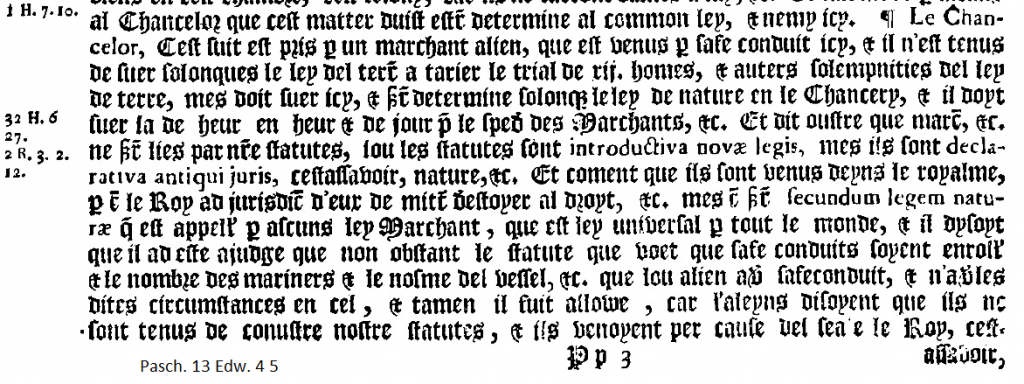In English Law, there are old cases reported in Law French, in the Year Books. Many contemporary jurists might dismiss them as merely the poorly reported opinions of judges, of little legal merit. This may be true for some of their contents, but not for all of it. Within the Year Books, we find certain statements, like the following:, said by Lord Chancellor Stillington:
… there are two kinds (maner) of powers (poyars) and processes, that is, ‘potentia ordinata’ (ordered power) and ‘absoluta’ (absolute power); ‘ordinata’ (ordered) is where a certain order is observed, as in positive law (ley positive), but the law of nature ‘has no certain order’ (non habet certum ordinem), but by whatever means that the truth can be known, etc. and ‘so it is called absolute process’ etc. and ‘it is required in the law of nature’ that the parties be present, etc. or that they be absent by contempt (contumacy), that is to say, where they are garnished (warned, garnies) and they default, etc. and ‘examination into the truth’ (examinatio veritatis)” (Trin. 9 Edw. 4 9 (fol. 14a) https://www.bu.edu/phpbin/lawyearbooks/display.php?id=20088)
Indigenous Law, then, in the main, inclines to absolute power, not ordered power, and that the real issue is that the truth be known. This could explain why Dr. Amie Wolf thought it prudent to identify students whom she thought unfit to teach Indigenous Education. This is a sort of absolute process, akin to the law of nature. She has laid the charge into the Court of Nature, and now what will happen? Who is to say?
Certainly adherents to the Crown system of law want something done about this, because they believe in privacy and other sorts of statute law. This too, is explained by the Lord Chancellor, in reference to merchants:
merchants, etc. will not be bound by our statutes, where the statutes are introductive of new law (introductiva novae legis), but (foreign merchants will be bound when) they (the statutes) are declarative of old right (declarativa antiqui juris), that is to say, nature, etc.; and even though they (foreign merchants) have come within the realm, so the king has jurisdiction over them to put them to stand (estoyer) to right, etc., but this will be ‘according to the laws of nature’ (secundum legem naturae) which is called by some ‘law merchant’, which is universal law for everyone (tout le monde) (Pasch. 13 Edw. 4 5, https://www.bu.edu/phpbin/lawyearbooks/display.php?id=20338)
If we combine these two notions, we get the idea of an Indigenous Merchant, governed only by universal law. Statutes are only binding where they declare old right, for example, the law merchant, but where they introduce new law, they are not binding on indigenous merchants. Whether this view is legally enforceable or not is one question, but it is a valid point of view: privacy law, and its ordered process, are offensive to a certain disposition where absolute process under natural law would ultimately lead to the truth being revealed.
And in this case the truth is what Dr. Wolf says about the individuals; it is true that she has said it. Whether others evaluate her statements to be true or not, well, that is up to them. The positive law and its ordered process in Canada in 2021 may favor protection of privacy more than some would like, especially where the education of indigenous people is concerned.


